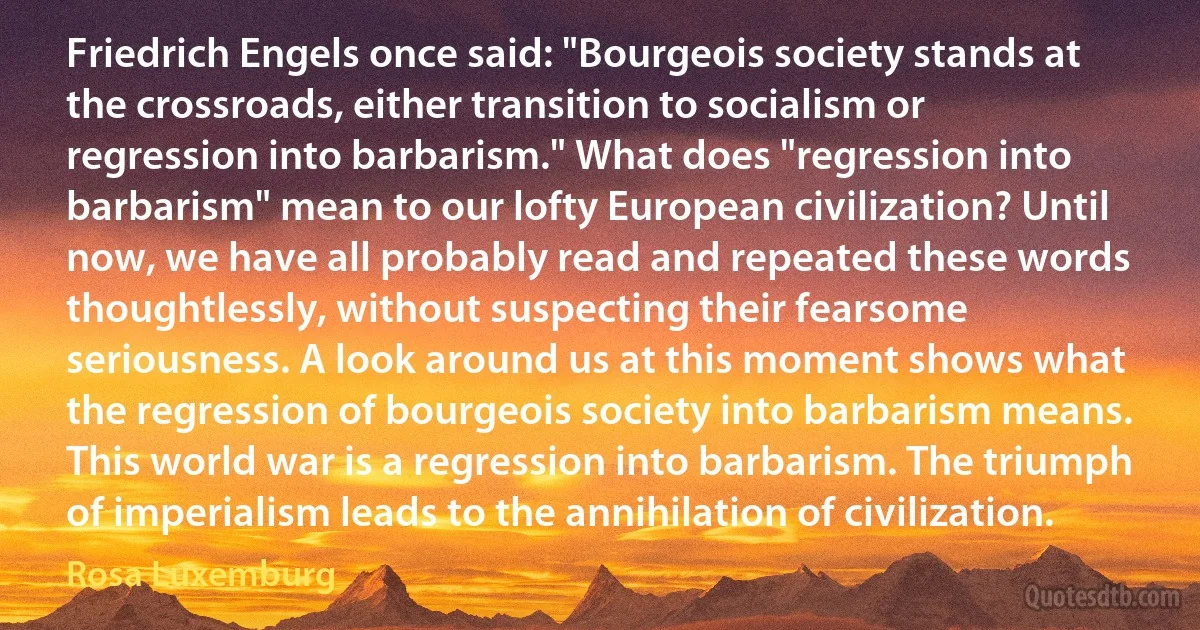European Quotes - page 47
[P]op prophets tell us that Muslims in Europe are reproducing so fast and European societies are so weak and listless that, before you know it, the continent will become "Eurabia," with all the topless gals on the Rivera wearing veils. Well, maybe not. The notion that continental Europeans, who are world-champion haters, will let the impoverished Muslim immigrants they confine to ghettos take over their societies and extent the caliphate from the Amalfi Coast to Amsterdam has it exactly wrong.

Ralph Peters
[T]he American dream is still alive and well, thanks: Even the newest taxi driver stumbling over his English grammar knows he can truly become an American. But European Muslims can't become French or Dutch or Italian or German. Even if they qualify for a passport, they remain second-class citizens. On a good day. And they're supposed to take over the continent that's exported more death than any other?

Ralph Peters
Through massive immigration and official dhimmitude from European leaders, Muslims are accomplishing today what they have tried but failed to do for over a millennium: conquer Europe. If current demographic trends continue, France, Holland, and other Western European nations could have Muslim majorities by mid-century. ... Europe is now reaping what it has long sown. Bat Ye'or, the pioneering historian of dhimmitude, chronicles how this has come to pass. Europe, she explains, began thirty years ago to travel down a path of appeasement, accommodation, and cultural abdication in pursuit of shortsighted political and economics benefits. She observe that today, "Europe has evolved from a Judeo-Christian civilization, with important poste-Enlightenment/secular elements, to a 'civilization of dhimmitued,", i. e, Eurabia: a secular-Muslim transitional society withits traditional Judeo-Christian more rapidly disappearing."

Robert Spencer
As in other European countries there were anti-semitic tendencies in pre-Hitler Austria too. Formerly political forces, together with the official authorities, had been sufficiently strong to prevent any excesses and nip any outburst in the bud apart from some verbal invective. Karl Renner says: ... Throughout the Christian Social period in power no harm came to a single Jew in Vienna; in fact the Jewish element made far greater progress in the press, literature, theatre and business worlds than in the previous so-called liberal period... It must not be forgotten, however, that Vienna was the entry point for Jews from the East who did not assimilate easily.

Kurt Schuschnigg
Because of the work of generations, because we've stood together in a great alliance, because people across this continent have forged a European Union dedicated to cooperation and peace, we have made historic progress toward the vision we share -- a Europe that is whole and free and at peace. And yet, as we gather here today, we know that this vision is threatened by Russia's aggression against Ukraine. It is a brazen assault on the territorial integrity of Ukraine -- a sovereign and independent European nation. It challenges that most basic of principles of our international system -- that borders cannot be redrawn at the barrel of a gun; that nations have the right to determine their own future.

Barack Obama
Would people still use the same demeaning language talking about European gypsies or immigrants? It is fundamentally an old, 19th-century throwback to the idea that that these people are somehow like our ancestors, or backward. It conveys that they are somehow not as intelligent as we are; that they haven't progressed as far as we have. It is fundamentally a colonial mentality.

Stephen Corry
Whatever the reasons behind dubbing Modi an international pariah and the subject of a diplomatic boycott involving both the US and the European Union member states, one conclusion was inescapable: it was a brazen attempt to pronounce judgment on the internal affairs of a sovereign country. Modi, after all, hadn't been held guilty [of] "mass murder" by an Indian criminal court. Indeed, there were no charges against him then or subsequently. Yes, the Gujarat leader had been pilloried mercilessly by both his political opponents and the human rights lobby that has formidable international links. A political aversion to Modi was translated into the diplomatic censure of a man who held a [c]onstitutional position. It was a step too far and one that didn't lend itself to an easy U-turn.

Swapan Dasgupta
My father's mother, a pure-blooded Indian from Oaxaca, had been a gifted fifteen-year-old when Benito Juárez won Mexico's independence from France. They'd taken her to the Academy of blah-blah-blah in Mexico City, and she'd astonished her European professors by learning French in six weeks.

Victor Villaseñor
The Kropotkins, the Perovskayas, the Breshkovskayas, and hosts of others repudiated wealth and station and refused to serve King Mammon. They went among the people, not to lift them up but themselves to be lifted up, to be instructed, and in return to give themselves wholly to the people. That accounts for the heroism, the art, the literature of Russia, the unity between the people, the mujik and the intellectual. That to some extent explains the literature of all European countries, the fact that the Strindbergs, the Hauptmanns, the Wedekinds, the Brieux, the Mirbeaus, the Steinlins and Rodins have never dissociated themselves from the people.

Emma Goldman
Both the existence of these parallels and their tragic nature would not have escaped Charles Kindleberger, whose World in Depression, 1929-1939 was published exactly 40 years ago, in 1973. Where Kindleberger's canvas was the world, his focus was Europe. While much of the earlier literature, often authored by Americans, focused on the Great Depression in the US, Kindleberger emphasised that the Depression had a prominent international and, in particular, European dimension. It was in Europe where many of the Depression's worst effects, political as well as economic, played out. And it was in Europe where the absence of a public policy authority at the level of the continent and the inability of any individual national government or central bank to exercise adequate leadership had the most calamitous economic and financial effects.

Barry Eichengreen

![It has been suggested by some people in this country that I and my government will be a "soft touch" in the [European] Community. In case such a rumour may have reached your ears, Mr Chancellor... it is only fair that I should advise you frankly to dismiss it (as my own colleagues did, long ago). We shall judge what British interests are and we shall be resolute in defending them. (Margaret Thatcher)](https://cdn.quotesdtb.com/img/quotes_images_webp/15/margaret-thatcher-advise-british-884715.webp)

